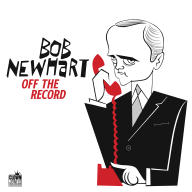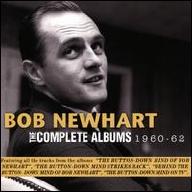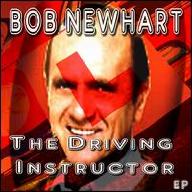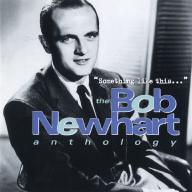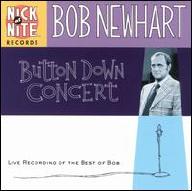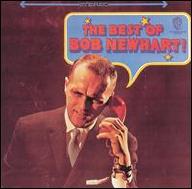Born George Robert Newhart on September 5, 1929, in Oak Park, IL, he followed a stint in the Army by finding work as a Chicago accountant and advertising copywriter while also performing infrequently in a local theatrical stock company. At the ad agency, Newhart and co-worker Ed Gallagher often whiled away their time by placing long, bizarre phone calls to each other, which they eventually began recording as audition tapes for comedy work. When Gallagher opted to begin taking the job more seriously, Newhart continued on alone, honing the one-man, two-way telephone call routines that became the hallmark of his stage act.
In 1959, a Chicago disc jockey introduced Newhart to Warner Bros. talent head George Avakian, who signed the aspiring performer to a contract solely on the basis of his home recordings; to date, Newhart had yet to perform his comedy before a live audience. After developing more phone-call monologues as well as playing off his natural stammer to establish a mild-mannered, even nervous, everyman persona, he began performing in nightclubs; his strongest routines, particularly The Driving Instructor, skewered suburban sensibilities with a wry, modernist eye akin to a warmer, friendlier Shelley Berman.
His debut LP, The Button-Down Mind of Bob Newhart, appeared in early 1960; its success was unprecedented, becoming the first comedy record ever to top the Billboard album charts. Newhart became an overnight star, and quickly graduated from selling out nightclubs to selling out theaters. Later in the year, the follow-up, The Button-Down Mind Strikes Back!, also proved phenomenally popular, and for over eight months the albums held down both the number one and number two spots on the charts.
After a third successful record, 1961's Behind the Button-Down Mind, Newhart made his first foray into television with an eponymously titled variety and sketch comedy program. Despite critical raves and both an Emmy and a Peabody award, the show fared poorly and was canceled after only one season; 1962's LP The Button-Down Mind on TV reprised material first heard on the series. That year also marked Newhart's feature film debut in a supporting role in the wartime drama #Hell Is for Heroes, followed in 1963 by the conversational LP Bob Newhart Faces Bob Newhart.
After two more albums, 1965's Windmills Are Weakening and 1966's This Is It, he gradually receded from the nightclub stage; after accepting a string of supporting roles in films, including 1970's #On a Clear Day You Can See Forever and #Catch-22, he returned to television in 1972 with another offering titled #The Bob Newhart Show. This one, a sitcom featuring Newhart as Chicago psychologist Bob Hartley, proved remarkably successful; backed by a brilliant supporting cast including Suzanne Pleshette, Bill Daily, and Peter Bonerz, the show was an instant hit and aired through 1978, at which point its star felt the series had run its course.
Newhart subsequently returned to the stage for a two-year comedy tour, although he did not record any of the material for live release. In 1982, he resurfaced with the series #Newhart, another massively successful effort that ran until 1990. In 1991, Newhart toured for the first time in over a decade; another series, titled simply #Bob, followed in 1994, but it lasted little more than a year. In 1997 he released his first album in over three decades: titled The Button-Down Concert, it featured all-new live recordings of the material first presented on the original 1960 Button-Down Mind LP. ~ Jason Ankeny, Rovi


